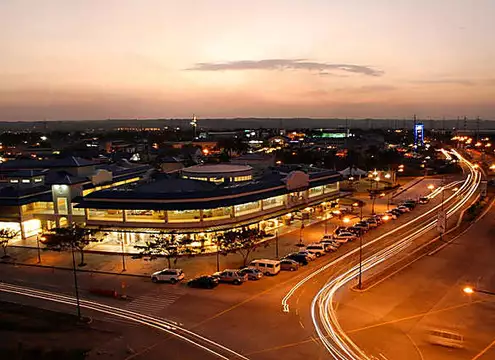Step up R&D on rice farming, DOST tells state scientists
The Department of Science and Technology called for state scientists to ramp up research and development activities that were more accessible to farmers to support rice security in the country.
“Whether the cost that we have invested have generated the desired benefits, we still have to see that these are adapted on a wider scale with the goal of reaching more rice and rice farming communities nationwide towards achieving a rice secure Philippines,” Science Secretary Fortunato T. dela Peña said in a statement.
Speaking to staff of the Philippine Rice Research Institute last week, Dela Peña cited the outputs of rice R&D and the industry’s role in helping the country’s rice sector.
ADVERTISEMENT
“In a country where rice is a staple food, nothing compares for an ordinary citizen than to be assured of having an affordable, accessible, high-quality, and nutritious rice at all times,” he said.
Dela Peña was referring to technologies developed under the Rice Industry Strategic S&T Program, which supports efforts to achieve self-sufficiency in rice production by 2020.
The program is a partnership among government agencies PhilRice, Philippine Center for Postharvest Development and Mechanization (PhilMech), Philippine Council for Agriculture, Aquatic and Natural Resources Research and Development (PCCARD), Metal Industry Research and Development Center and the University of the Philippines Los Baños (UPLB).
Among these technologies is the use of certified seeds, bio-stimulants and elicitors, and efficient use of fertilizers and water were targeted to increase productivity by 10 percent while reducing production cost by 5 percent.
Subscribe to INQUIRER PLUS to get access to The Philippine Daily Inquirer & other 70+ titles, share up to 5 gadgets, listen to the news, download as early as 4am & share articles on social media. Call 896 6000.
VIDEO : Duterte apologizes to Jews for Hitler remark: ‘No intention to derogate’
For feedback, complaints, or inquiries, contact us.
Read more: http://business.inquirer.net/214914/step-up-rd-on-rice-farming-dost-tells-state-scientists#ixzz4zp1bVbYy
Follow us: @inquirerdotnet on Twitter | inquirerdotnet on Facebookhttp://business.inquirer.net/214914/step-up-rd-on-rice-farming-dost-tells-state-scientists
[ACCRA] A research strategy to help boost rice production in Africa has been formally unveiled by the Africa Rice Center (AfricaRice), a pan-African agricultural research organisation.
The ten-year plan, launched this month (1 February) aims to help the continent become nearly 90 per cent self-sufficient in rice production by 2020, with at least ten countries expected to full meet their own needs.
This will be achieved through setting seven priorities for research.
These include providing farmers with climate-resilient rice varieties; expanding rice-producing areas while addressing environmental concerns; creating market opportunities for smallholders; and linking up with development partners and the private sector to stimulate the uptake of rice knowledge and technologies.
The plan will largely be implemented under the Global Rice Science Partnership, a research programme of the Consultative Group on International Agricultural Research that launched in November 2010.
Papa Abdoulaye Seck, director-general of AfricaRice, told SciDev.Net: "AfricaRice's new Strategic goal is to realise Africa's tremendous rice potential, as the centre strongly believes the continent has the wherewithal be it human, physical and economic, to produce enough rice to feed itself".
It is hoped that rice production in Sub-Saharan Africa will increase from 18.4 million tons in 2010 to 46.8 million tons by 2020, and that research and development will also be boosted by the training of 30 PhD and MSc students and 100 technicians a year.
Seck said that the project costs are estimated at US$420 million. However a further US$1.2 billion will be needed to fully implement the strategy.
The funding will come from a number of donors including the Bill and Melinda Gates Foundation, UK Department for International Development (DFID), and the World Bank. Full funding has not yet been secured as donors are still honouring their pledges, Seck said.
Key players in implementing the strategy will be scientists from national agricultural programmes in the 24 member states in Sub-Saharan Africa that belong to AfricaRice.
"Such a project is usually challenging in the face of adequate funds and staff, lack of adaptable and consumer-preferred varieties and access to rudimentary tools for production," Godfrey Asea, plant breeder at theNational Agricultural Research Organization, in Uganda, told SciDev.Net.
The Ghanaian deputy minister for food and agriculture, Yaw Effah-Baafi, said the scheme would assist countries like Ghana, which spends US$450 million per year on importing rice to meet some 70 per cent of local demand.
The strategy was approved last September at the meeting of the AfricaRice's Council of Ministers, who also approved the launch of an Africa-wide task forces set up to accelerate delivery of rice technologieshttp://www.scidev.net/global/biotechnology/news/plan-to-boost-african-rice-r-d-unveiled.html
The ten-year plan, launched this month (1 February) aims to help the continent become nearly 90 per cent self-sufficient in rice production by 2020, with at least ten countries expected to full meet their own needs.
This will be achieved through setting seven priorities for research.
These include providing farmers with climate-resilient rice varieties; expanding rice-producing areas while addressing environmental concerns; creating market opportunities for smallholders; and linking up with development partners and the private sector to stimulate the uptake of rice knowledge and technologies.
The plan will largely be implemented under the Global Rice Science Partnership, a research programme of the Consultative Group on International Agricultural Research that launched in November 2010.
Papa Abdoulaye Seck, director-general of AfricaRice, told SciDev.Net: "AfricaRice's new Strategic goal is to realise Africa's tremendous rice potential, as the centre strongly believes the continent has the wherewithal be it human, physical and economic, to produce enough rice to feed itself".
It is hoped that rice production in Sub-Saharan Africa will increase from 18.4 million tons in 2010 to 46.8 million tons by 2020, and that research and development will also be boosted by the training of 30 PhD and MSc students and 100 technicians a year.
Seck said that the project costs are estimated at US$420 million. However a further US$1.2 billion will be needed to fully implement the strategy.
The funding will come from a number of donors including the Bill and Melinda Gates Foundation, UK Department for International Development (DFID), and the World Bank. Full funding has not yet been secured as donors are still honouring their pledges, Seck said.
Key players in implementing the strategy will be scientists from national agricultural programmes in the 24 member states in Sub-Saharan Africa that belong to AfricaRice.
"Such a project is usually challenging in the face of adequate funds and staff, lack of adaptable and consumer-preferred varieties and access to rudimentary tools for production," Godfrey Asea, plant breeder at theNational Agricultural Research Organization, in Uganda, told SciDev.Net.
The Ghanaian deputy minister for food and agriculture, Yaw Effah-Baafi, said the scheme would assist countries like Ghana, which spends US$450 million per year on importing rice to meet some 70 per cent of local demand.
The strategy was approved last September at the meeting of the AfricaRice's Council of Ministers, who also approved the launch of an Africa-wide task forces set up to accelerate delivery of rice technologieshttp://www.scidev.net/global/biotechnology/news/plan-to-boost-african-rice-r-d-unveiled.html
Speed read
- Experts say private-public partnerships could help solve challenges in rice R&D
- Such partnerships enable increased rice production in Africa
- A seed company manager adds that partnerships aid in selecting good varieties
[COTONOU, BENIN] Africa’s private and public sector institutions should collaborate to address rice research and production challenges, a forum has heard.
Rice researchers, scientists, policymakers, processors and seed producers who a attended the 2016 AfricaRice Science Week and Global Rice Science Partnership-Africa Science Forum last month (1-5 February) at the Africa Rice Center in Benin.
The conference was organised by AfricaRice, a member of the CGIAR Consortium, to review activities carried out by rice sector development hub teams carried out in 2015.
The forum also sought to disseminate scalable technologies for rice production and carry out effective and efficient planning of rice research-for-development (R4D) activities in 2016.
The forum was attended by 200 experts from 30 countries, 27 of which are in Africa, including Cote d’Ivoire, Madagascar, Nigeria and Senegal.
Marco Wopereis, AfricaRice deputy director-general, told the forum that African countries will face a strong demand for rice of around 38 million tons by 2040, urging researchers to help farmers increase production capacity “to grow rice in Africa for Africa”. “The private sector’s involvement is absolutely essential to develop rice cultivation,” Wopereis said.
Rice experts said that the combined efforts and strengths of public-private sector partnerships of all actors in the rice value chain could help increase production and stimulate research on rice in Africa.
Noting that rice is a strategic crop for achieving food security and providing export opportunities, AfricaRice director-general Harold Roy-Macauley, called for intensifying advances in scientific research to encourage such partnerships that are crucial for the development of increased rice production in Africa.
Sali Ndindeng, a researcher at AfricaRice, told SciDev.Net: “We have the same interests and a partnership between the private and public sector will achieve these interests.”
Lucie Eulalie Racalaharimino, a manager at Relharf Agro Business, a seed production company in Madagascar, added: “The close collaboration between the public and private sectors will allow us to know in advance the most efficient [rice] varieties for our business.”
This piece was produced by SciDev.Net’s Sub-Saharan Africa English desk.
http://www.scidev.net/sub-saharan-africa/cooperation/news/private-public-collaboration-rice-r-d.htmlhttp://www.philstar.com:8080/business/2017/09/10/1737375/rd-investments-seen-boost-rice-outputRice researchers, scientists, policymakers, processors and seed producers who a attended the 2016 AfricaRice Science Week and Global Rice Science Partnership-Africa Science Forum last month (1-5 February) at the Africa Rice Center in Benin.
The conference was organised by AfricaRice, a member of the CGIAR Consortium, to review activities carried out by rice sector development hub teams carried out in 2015.
“The private sector’s involvement is absolutely essential to develop rice cultivation.”
Marco Wopereis, AfricaRice
The forum also sought to disseminate scalable technologies for rice production and carry out effective and efficient planning of rice research-for-development (R4D) activities in 2016.
The forum was attended by 200 experts from 30 countries, 27 of which are in Africa, including Cote d’Ivoire, Madagascar, Nigeria and Senegal.
Marco Wopereis, AfricaRice deputy director-general, told the forum that African countries will face a strong demand for rice of around 38 million tons by 2040, urging researchers to help farmers increase production capacity “to grow rice in Africa for Africa”. “The private sector’s involvement is absolutely essential to develop rice cultivation,” Wopereis said.
Rice experts said that the combined efforts and strengths of public-private sector partnerships of all actors in the rice value chain could help increase production and stimulate research on rice in Africa.
Noting that rice is a strategic crop for achieving food security and providing export opportunities, AfricaRice director-general Harold Roy-Macauley, called for intensifying advances in scientific research to encourage such partnerships that are crucial for the development of increased rice production in Africa.
Lucie Eulalie Racalaharimino, a manager at Relharf Agro Business, a seed production company in Madagascar, added: “The close collaboration between the public and private sectors will allow us to know in advance the most efficient [rice] varieties for our business.”
This piece was produced by SciDev.Net’s Sub-Saharan Africa English desk.













No comments:
Post a Comment